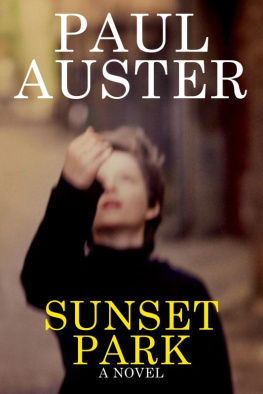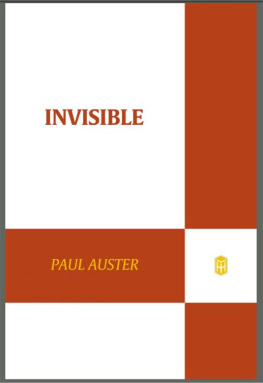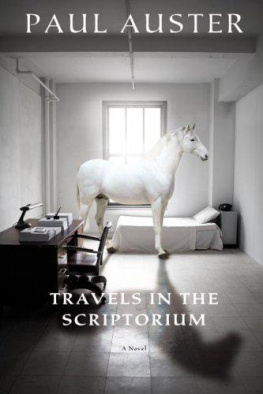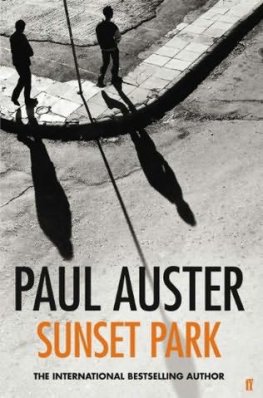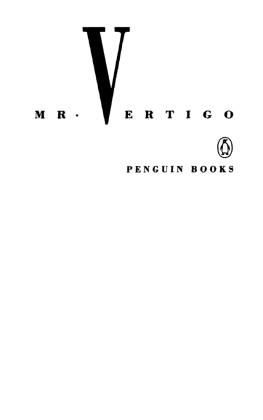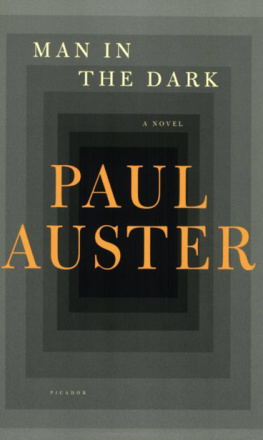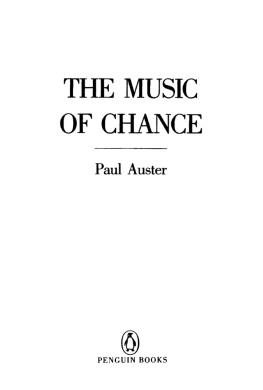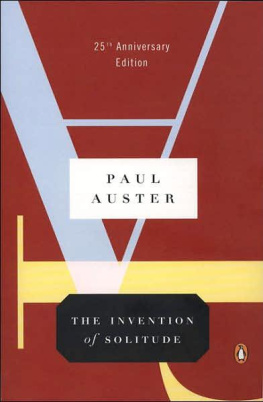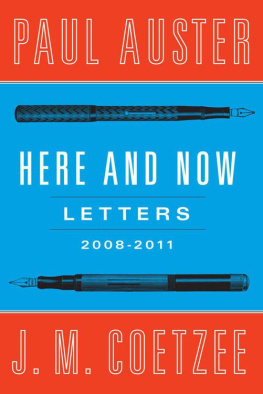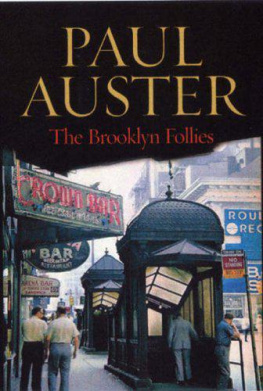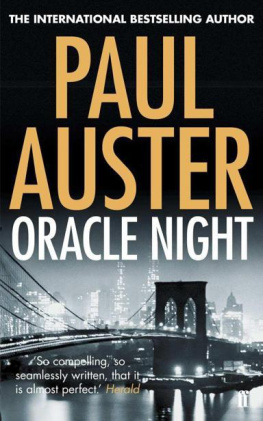Paul Auster - Collected Prose
Here you can read online Paul Auster - Collected Prose full text of the book (entire story) in english for free. Download pdf and epub, get meaning, cover and reviews about this ebook. year: 2005, publisher: Henry Holt and Company, genre: Detective and thriller. Description of the work, (preface) as well as reviews are available. Best literature library LitArk.com created for fans of good reading and offers a wide selection of genres:
Romance novel
Science fiction
Adventure
Detective
Science
History
Home and family
Prose
Art
Politics
Computer
Non-fiction
Religion
Business
Children
Humor
Choose a favorite category and find really read worthwhile books. Enjoy immersion in the world of imagination, feel the emotions of the characters or learn something new for yourself, make an fascinating discovery.

- Book:Collected Prose
- Author:
- Publisher:Henry Holt and Company
- Genre:
- Year:2005
- Rating:3 / 5
- Favourites:Add to favourites
- Your mark:
- 60
- 1
- 2
- 3
- 4
- 5
Collected Prose: summary, description and annotation
We offer to read an annotation, description, summary or preface (depends on what the author of the book "Collected Prose" wrote himself). If you haven't found the necessary information about the book — write in the comments, we will try to find it.
Collected Prose — read online for free the complete book (whole text) full work
Below is the text of the book, divided by pages. System saving the place of the last page read, allows you to conveniently read the book "Collected Prose" online for free, without having to search again every time where you left off. Put a bookmark, and you can go to the page where you finished reading at any time.
Font size:
Interval:
Bookmark:
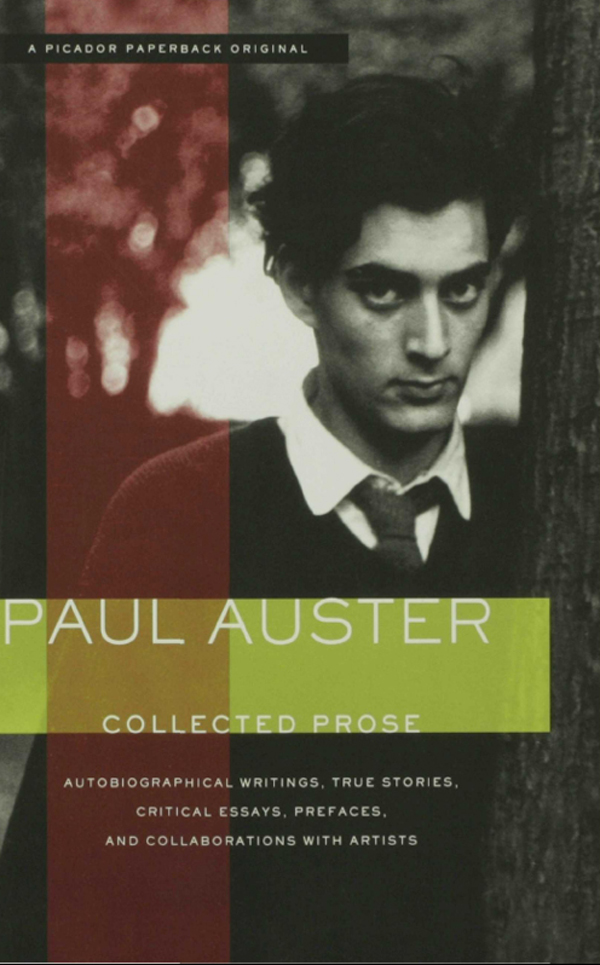
Also by Paul Auster
Novels
The New York Trilogy (City of Glass Ghosts The Locked Room)
In the Country of Last Things Moon Palace
The Music of Chance Leviathan Mr. Vertigo Timbuktu
The Book of Illusions Oracle Night
Nonfiction
White Spaces The Invention of Solitude
The Art of Hunger Why Write? Hand to Mouth
The Story of My Typewriter (with Sam Messer)
The Red Notebook
Screenplays
3 Films: Smoke, Blue in the Face, Lulu on the Bridge
Poetry
Unearth Wall Writing Fragments from Cold Facing the Music
Disappearances: Selected Poems Collected Poems
Editor
The Random House Book of Twentieth-Century French Poetry
I Thought My Father Was God and Other True Tales from
NPRs National Story Project
COLLECTED PROSE
Autobiographical Writings, True Stories, Critical Essays, Prefaces and Collaborations with Artists
Paul Auster
Picador
Henry Holt and Company
New York
COLLECTED PROSE. Copyright 2003 by Paul Auster. All rights reserved. Printed in the United States of America. No part of this book may be used or reproduced in any manner whatsoever without written permission except in the case of brief quotations embodied in critical articles or reviews. For information, address Picador, 175 Fifth Avenue, New York, N.Y. 10010.
www.picadorusa.com
Picador is a U.S. registered trademark and is used by Henry Holt and Company under license from Pan Books Limited.
For information on Picador Reading Group Guides, as well as ordering, please contact the Trade Marketing department at St. Martins Press.
Phone: 1-800-221-7945 extension 763
Fax: 212-677-7456
E-mail: trademarketing@stmartins.com
Typewriter paintings Sam Messer
Kiss and Make Up Art Spiegelman, 1993
For further copyright information see page 511
ISBN 0-312-42468-X
EAN 978-0312-42468-8
First published in Great Britain by Faber and Faber Limited
10 9 8 7 6 5 4 3 2
This book could not have been done
without the remarkable assistance of Angus Cargill.
THE INVENTION OF SOLITUDE
In searching out the truth be ready for the unexpected, for it is difficult to find and puzzling when you find it.
Heraclitus
One day there is life. A man, for example, in the best of health, not even old, with no history of illness. Everything is as it was, as it will always be. He goes from one day to the next, minding his own business, dreaming only of the life that lies before him. And then, suddenly, it happens there is death. A man lets out a little sigh, he slumps down in his chair, and it is death. The suddenness of it leaves no room for thought, gives the mind no chance to seek out a word that might comfort it. We are left with nothing but death, the irreducible fact of our own mortality. Death after a long illness we can accept with resignation. Even accidental death we can ascribe to fate. But for a man to die of no apparent cause, for a man to die simply because he is a man, brings us so close to the invisible boundary between life and death that we no longer know which side we are on. Life becomes death, and it is as if this death has owned this life all along. Death without warning. Which is to say: life stops. And it can stop at any moment.
The news of my fathers death came to me three weeks ago. It was Sunday morning, and I was in the kitchen preparing breakfast for my small son, Daniel. Upstairs my wife was still in bed, warm under the quilts, luxuriating in a few extra hours of sleep. Winter in the country: a world of silence, wood smoke, whiteness. My mind was filled with thoughts about the piece I had been writing the night before, and I was looking ahead to the afternoon when I would be able to get back to work. Then the phone rang. I knew instantly that there was trouble. No one calls at eight oclock on a Sunday morning unless it is to give news that cannot wait. And news that cannot wait is always bad news.
I could not muster a single ennobling thought.
Even before we packed our bags and set out on the three-hour drive to New Jersey, I knew that I would have to write about my father. I had no plan, had no precise idea of what this meant. I cannot even remember making a decision about it. It was simply there, a certainty, an obligation that began to impose itself on me the moment I was given the news. I thought: my father is gone. If I do not act quickly, his entire life will vanish along with him.
Looking back on it now, even from so short a distance as three weeks, I find this a rather curious reaction. I had always imagined that death would numb me, immobilize me with grief. But now that it had happened, I did not shed any tears, I did not feel as though the world had collapsed around me. In some strange way, I was remarkably prepared to accept this death, in spite of its suddenness. What disturbed me was something else, something unrelated to death or my response to it: the realization that my father had left no traces.
He had no wife, no family that depended on him, no one whose life would be altered by his absence. A brief moment of shock, perhaps, on the part of scattered friends, sobered as much by the thought of capricious death as by the loss of their friend, followed by a short period of mourning, and then nothing. Eventually, it would be as though he had never lived at all.
Even before his death he had been absent, and long ago the people closest to him had learned to accept this absence, to treat it as the fundamental quality of his being. Now that he was gone, it would not be difficult for the world to absorb the fact that he was gone forever. The nature of his life had prepared the world for his deathhad been a kind of death by anticipationand if and when he was remembered, it would be dimly, no more than dimly.
Devoid of passion, either for a thing, a person, or an idea, incapable or unwilling to reveal himself under any circumstances, he had managed to keep himself at a distance from life, to avoid immersion in the quick of things. He ate, he went to work, he had friends, he played tennis, and yet for all that he was not there. In the deepest, most unalterable sense, he was an invisible man. Invisible to others, and most likely invisible to himself as well. If, while he was alive, I kept looking for him, kept trying to find the father who was not there, now that he is dead I still feel as though I must go on looking for him. Death has not changed anything. The only difference is that I have run out of time.
For fifteen years he had lived alone. Doggedly, opaquely, as if immune to the world. He did not seem to be a man occupying space, but rather a block of impenetrable space in the form of a man. The world bounced off him, shattered against him, at times adhered to himbut it never got through. For fifteen years he haunted an enormous house, all by himself, and it was in that house that he died.
For a short while we had lived there as a familymy father, my mother, my sister, and I. After my parents were divorced, everyone dispersed: my mother began a new life, I went off to college, and my sister stayed with my mother until she, too, went off to school. Only my father remained. Because of a clause in the divorce agreement which stipulated that my mother still owned a share of the house and would be given half the proceeds whenever it was sold (which made my father reluctant to sell), or from some secret refusal to change his life (so as not to show the world that the divorce had affected him in a way he could not control), or simply from inertia, an emotional lethargy that prevented him from taking any action, he stayed on, living alone in a house that could have accommodated six or seven people.
Font size:
Interval:
Bookmark:
Similar books «Collected Prose»
Look at similar books to Collected Prose. We have selected literature similar in name and meaning in the hope of providing readers with more options to find new, interesting, not yet read works.
Discussion, reviews of the book Collected Prose and just readers' own opinions. Leave your comments, write what you think about the work, its meaning or the main characters. Specify what exactly you liked and what you didn't like, and why you think so.

